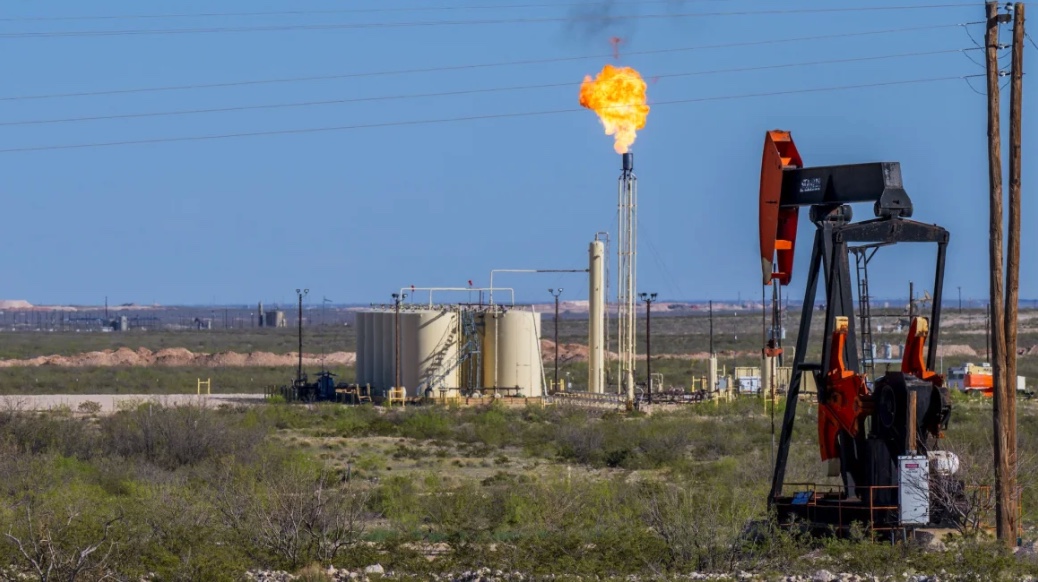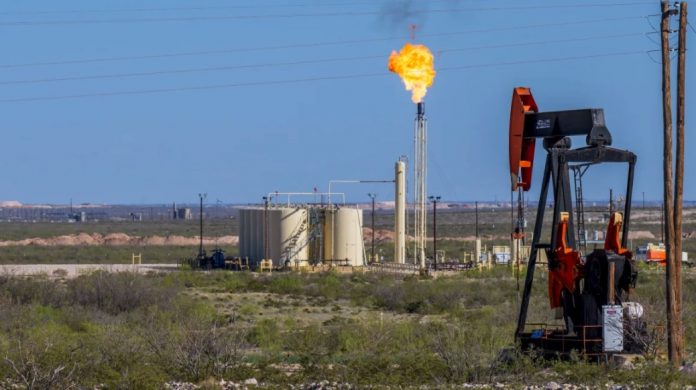สำนักงานคุ้มครองสิ่งแวดล้อมสหรัฐ (EPA) เพิ่งอนุมัติกฎข้อบังคับด้านสภาพอากาศของรัฐบาลไบเดนที่ค้างอยู่ โดยมุ่งลดการรั่วไหลของก๊าซมีเทน ซึ่งเป็นก๊าซที่มีผลกระทบสูงต่อภาวะโลกร้อน
กฎดังกล่าวที่เสนอเกือบหนึ่งปีที่แล้ว ได้รับการบังคับใช้ภายใต้กฎหมายการลดเงินเฟ้อ (Inflation Reduction Act) ซึ่งอาจทำให้รัฐบาลของทรัมป์ต้องเจออุปสรรคในการยกเลิก
กฎใหม่บังคับให้ผู้ผลิตน้ำมันและก๊าซที่ปล่อยก๊าซมีเทนในปริมาณสูง ต้องจ่ายค่าธรรมเนียมสำหรับการระบายหรือเผาก๊าซแทนการดักจับ โดยรัฐบาลกลางจะเก็บค่าธรรมเนียมนี้จนกว่าบริษัทเหล่านั้นจะแก้ไขปัญหาการรั่วไหล
กฎนี้ยังเพิ่มแรงจูงใจทางการเงินให้กับบริษัทน้ำมันและก๊าซ เพื่อสนับสนุนการซ่อมแซมท่อหรือโครงสร้างพื้นฐานที่มีปัญหารั่วไหล
ก๊าซมีเทนซึ่งไม่มีกลิ่นและไม่สามารถมองเห็นได้ มีพลังทำให้โลกร้อนสูงกว่าก๊าซคาร์บอนไดออกไซด์ถึง 80 เท่า นอกจากนี้ยังเป็นองค์ประกอบหลักของก๊าซที่ใช้ในการทำความร้อนในบ้านและให้พลังงานแก่เตา และยังเป็นผลพลอยได้หลักจากการขุดเจาะน้ำมันและก๊าซ
ทั้งนี้ ก๊าซมีเทนกำลังทำให้โลกร้อนขึ้นอย่างรวดเร็ว คณะนักวิทยาศาสตร์นานาชาติได้ระบุว่าความเข้มข้นของก๊าซมีเทนในบรรยากาศขณะนี้สูงกว่าทุกช่วงเวลาในรอบอย่างน้อย 800,000 ปี และก๊าซชนิดนี้มีส่วนทำให้โลกร้อนขึ้นถึงหนึ่งในสาม ตามรายงานของ EPA
กฎดังกล่าวอาจเป็นเรื่องยากสำหรับรัฐบาลทรัมป์ที่จะยกเลิกได้ เนื่องจากโครงการนี้ถูกรวมไว้ในกฎหมายสภาพภูมิอากาศของไบเดนซึ่งผ่านสภาคองเกรสในปี 2022 การยกเลิกจึงต้องผ่านสภาคองเกรสอีกครั้ง ซึ่งแม้จะไม่ใช่เรื่องเป็นไปไม่ได้หากพรรครีพับลิกันสามารถครองเสียงข้างมากในสภาผู้แทนราษฎรได้ แต่ก็เป็นเรื่องที่ยากและใช้เวลานานกว่าที่รัฐบาลทรัมป์จะดำเนินการเอง
ไมเคิล รีแกน ผู้บริหาร EPA กล่าวว่า “EPA ได้ทำงานร่วมกับภาคอุตสาหกรรม รัฐ และชุมชน เพื่อลดการปล่อยก๊าซมีเทนเพื่อให้ก๊าซธรรมชาตินั้นถึงมือผู้บริโภคในรูปแบบของเชื้อเพลิงที่สามารถใช้ได้ แทนที่จะกลายเป็นก๊าซเรือนกระจกที่เป็นอันตราย”
ตามรายงานของ EPA กฎนี้เพียงอย่างเดียวจะสามารถป้องกันไม่ให้ก๊าซมีเทนจำนวน 1.2 ล้านเมตริกตันรั่วไหลสู่ชั้นบรรยากาศ ซึ่งเทียบเท่ากับการนำรถยนต์ที่ใช้ก๊าซออกจากท้องถนนเกือบ 8 ล้านคันเป็นเวลา 1 ปี
Biden just finalized a major climate rule. This one could be tricky for Trump to dismantle

The Environmental Protection Agency just finalized one of the Biden administration’s only outstanding climate rules, aimed at cracking down on leaks of methane — a potent planet-warming gas with an outsized impact on the climate.
The rule, proposed nearly a year ago, was mandated by the Inflation Reduction Act, which could make it more difficult for the second Trump administration to dismantle.
The new rule charges high-emitting oil and gas producers a fee for wasting methane above a certain threshold by venting or flaring it into the atmosphere instead of capturing it. The methane fee will be charged by the federal government until the companies fix the leaks.
This fee was paired with financial incentives for oil and gas companies to fix leaky pipelines or infrastructure.
Methane is an odorless and invisible gas that has more than 80 times the warming power of carbon dioxide. Methane is the main component of the gas that heats our homes and powers our stoves, and it’s one of the main byproducts of oil and gas drilling.
It’s also dramatically warming the planet. An international body of scientists has concluded that the concentration of methane in the atmosphere is higher now than any time in at least 800,000 years. It’s responsible for as much as a third of the global warming the planet has experienced so far, according to the EPA.
The rule could prove tricky for the incoming Trump administration to overturn because the program was included in Biden’s climate law, which passed Congress in 2022. Undoing it would take another act of Congress; while not impossible if Republicans take the House of Representatives, it could be an uphill climb and take longer than if the Trump administration were acting on its own.
“EPA has been engaging with industry, states, and communities to reduce methane emissions so that natural gas ultimately makes it to consumers as usable fuel instead of as a harmful greenhouse gas,” EPA administrator Michael Regan said in a statement.
According to the EPA, this rule alone would prevent 1.2 million metric tons of methane from polluting the atmosphere – the equivalent of taking nearly 8 million gas-powered cars off the road for a year.
By Ella Nilsen, CNN

















